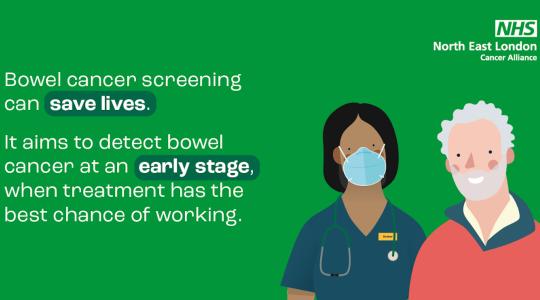Breast cancer awareness month October 2022
The North East London Cancer Alliance is working on a number of initiatives to raise awareness of the signs and symptoms of breast cancer, as well as the importance of attending breast screening appointments, during Breast Cancer Awareness month this October.
Our activity includes:
- promoting the North East London Cancer Alliance’s animated breast screening video
- directing people to view our breast cancer signs and symptoms web page
- launching a unique LGBTIQ+ inclusive Breast Cancer Screening campaign with charity OUTpatients to addresses the barriers between the medical and LGBTIQ+ communities and to help increase the uptake of screening, saving lives
- running an advertising campaign to emphasise the importance of seeking help via your doctor if you have signs or symptoms of breast cancer
- delivering a social media campaign throughout October via the North East London Cancer Alliance Twitter, Facebook and Instagram accounts
Please help us by sharing these resources with family, friends and colleagues.
Breast screening
If you have an appointment for breast screening, it is important that you attend. It is unlikely that we will find any cancer, but catching any sign of cancer early is key so that it can be treated.
Breast screening facts
Breast cancer screening saves the lives of around 1,300 women every year in the UK and around 21,000 cancers are detected via this method.
The NHS in England carries out around 2.1m breast cancer screens each year in hospitals and mobile screening vans, usually in convenient community locations such as supermarket car parks.
Screening aims to find breast cancers at an early stage when they are too small to see or feel because when they are picked up early, treatment is much more likely to be successful.
The actual screening x-rays (mammograms) take only a few minutes to perform and help find breast cancers at an early stage when they are too small to see or feel.
Services are running and are safe from covid.
Breast screening eligibility
Women are offered breast screening on the NHS between the ages of 50 and up to their 71st birthday and are offered their first appointment before their 53rd birthday
Breast screening is also for some trans or non-binary people. Talk to your GP or Gender Identity Clinic about this.
Women who are over the age of 70 can contact their local breast screening centre for screening once every 3 years.
Women are offered screening from the age of 50 years as 80% of breast cancers (4 out of 5) are diagnosed in women aged over 50.
Check your breasts
But don’t just wait until your next screening appointment; anyone who has noticed any abnormal changes to their breasts should contact their GP as soon as possible.
The NHS believes people of all ages should be aware of their breast health. If you are concerned you should not hesitate to contact your GP.
Being ‘breast aware’ means getting to know how your breasts look and feel at different times and telling your doctor straight away if you notice any unusual changes. It is important that you continue to look at and check your breasts regularly, even if you have just had a mammogram.
The North East London Cancer Alliance encourages people to take a ‘TLC approach’:
TOUCH your breasts. Can you feel anything unusual?
LOOK for changes. Is there any change in shape or texture?
CHECK anything unusual with your doctor
Remember, if you have symptoms that you are worried about, such as a lump
or discharge, please contact your GP as soon as possible.
Men can get breast cancer too
Although rare, it is possible for men to get breast cancer too. About 1 in 100 (about 1%) of breast cancer cases in the UK are in males.
The single biggest risk factor for male breast cancer is getting older. Most breast cancers are diagnosed in men between the ages of 60 and 70.
Resources
More information on screening, including leaflets in a range of languages, is available on the London Breast Screening webpages. Remember to watch our breast screening video and to find out more about the symptoms of breast cancer, visit the North East London Cancer Alliance’s breast cancer signs and symptoms web page.






